Scott Berkun's Blog, page 66
September 21, 2011
How Yoga destroys creativity: Niemann on working with ideas
Great little diagram from an excellent talk by Christoph Niemann. He's showing an honest accounting of how his day as a designer/illustrator gets divided – note the time spent second guessing himself.
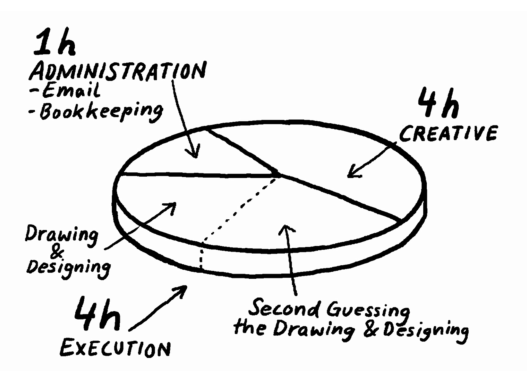
And this one about what creative work feels like:
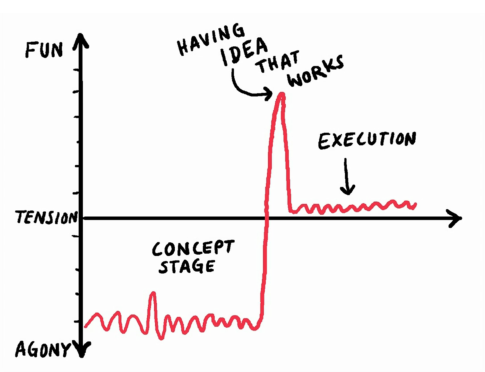
The talk is very funny – mostly because he makes great observations about creative work most people are afraid to talk about (including how Yoga will destroy your design career, at 9:30):
via 2011/04 Christoph Niemann on Vimeo.
Related posts:We are just like ants: the proof
Video: extended Q&A at RIM in Waterloo
Kids, waterfalls and subways (NYC)
Most interesting video you'll see today
(Video) How to Call BS on Social Media Gurus
September 20, 2011
Why I'm self publishing my next book
For the last year, I've been working on Mindfire: Big Ideas for Curious Minds. It's a collection of my best short works and essays to date. I decided long ago I'd self publish it, and it's almost done (pre-order here).
Here's why I'm self publishing:
I have crazy ideas for books. Books I doubt any publisher would accept. I don't want my creativity gated on someone else.
I expect to write books for a living the rest of my life. The more I know about every part of the process, the greater my odds of success.
The more I know about every part of the process, the better I can negotiate what a publisher can or can not do for me in the future.
I don't know how well I can promote a book on my own. There is only one way to find out.
Every author complains about compromises with their publisher. Self publishing is one way to not to have to compromise on anything. If this book sucks, I have no one to blame. I like having no one to blame.
The tools are amazing. Kickstarter, BookBaby and Lightning Source. The hardest part will always be writing the book, but all the other tools make self-publishing easier and cheaper than ever in history.
Even if I never self-publish again, I'll never look at a book the same way again. I love books. I want to look at them with great understanding of what's involved in their creation.
The book is almost done and should be out in late October. You can help support the book on kickstarter, or if you want to help with PR, please join the berkunfan group.
Over the next few weeks I'll be talking more about the book and lessons learned. Have questions? ask below.
If you want to be notified when the book is out, join the mailing list.
Related posts:Need ideas: fun rewards for Mindfire book pre-orders?
The waiting
Mysteries of book publishing, part 1
From the mailbag: Best request ever for writing advice
Help wanted: Editor/Curator for my next book
The false dichotomy of false dichotomies
There is a false dichotomy in believing that all dichotomies are either true or false.
To say "you either win or lose" is a dichotomy. It divides everything into two piles.
To call something a false dichotomy suggests the division is wrong and that there are more than two piles. For example, in most sporting events there is the possibility of a tie, where neither team wins or loses.
The trap in calling something a false dichotomy is it suggests there are true dichotomies. But true dichotomies are rare. They mostly occur in mathematics or science where terms are rigorously defined. For example, a true dichotomy exists between even and odd numbers. By the specific definition of these words, it's impossible for a number to be both odd and even.
But almost nothing we dichotomize is truly divided into two piles. They are merely perceived dichotomies – divisions we project onto the world because of our perceptions and biases. For example, in the U.S. we divide people politically as Liberals and Conservatives, but the terms are so poorly defined it's easy to find examples of people who have some liberal views and some conservative views. There are other important alternatives for defining a person's politics (what do you want to liberate? what do you want to conserve? how do you think it should be done?), but the convenience of the false dichotomy of liberal vs. conservative hides them from consideration. The convenience of binary logic blinds us from how poor a foundation for thought it can be.
All dichotomies can be sub-divided into smaller groups. This is rarely observed in debate, but if you believe you can divide anything in half, this applies recursively. You can have conservative liberals and liberal conservatives. And conservative liberal conservatives and liberal conservative liberals. If you stop to carefully examine anything polarizing, even when you're certain you're on the right side, you'll discover nuance, contradiction and subtlety that will cause any wise mind to challenge the merits of the initial dichotomy.
Of course creating a dichotomy can serve a purpose. I may divide my list of contacts into two piles, friends and acquaintances, to help me decide who to invite to a party. But all dichotomies are arbitrary. Given a different purpose, I could create a very different way to divide the same list (people who like Duran Duran vs. people who hate Duran Duran). No law says we can only divide by two. Some divisions might have three groups, or five, instead of just two (e.g. people who like / hate / only like one song by Duran Duran). There are an infinite number of ways to divide that list, just as there are an infinite number of ways to divide anything. Depending on the goal, some ways are more useful than others.
In a sense, all perceived dichotomies are false if they are used too strongly. And the danger is when someone presents a perceived dichotomy as a real one, such as "You are either with us, or against us". I admit there is power in dividing the world in two, as it forces people to decide and take action, a useful thing for a leader to do. But the presenting of any perceived dichotomy as a real one should cause any wise person to ask:
What are other equally reasonable ways to divide this?
Is there a third important group being omitted?
Why did this person choose to omit them? Ignorance? Manipulation? Self-Interest? Inspiration?
Do they acknowledge there are other equally reasonable divisions?
False dichotomies are dangerous. And they are everywhere.
What false dichotomy annoys you the most? Leave a comment.
Related posts:Munich advice?
Stephen Colbert fights the closeminded
No holds barred tactics for UX in organizations
How project managers establish power
#42 – Why you must lead or follow
September 15, 2011
Why conferences cost so much
Great post on AndyBudd.com on why conferences costs so much:
Let's assume that this $1000 a ticket conference happens over 3 days with 3 tracks and attracts 300 people. That would indicate an income of $300,000. However once you've taken off transaction fees you looking at closer to $275,000. Let us assume that the venue day delegate rate is $100 per day which is actually quite low for a major conference venue. This brings the coffers down to $185,000. As a conference organiser you also have to pay the day delegate rate for all your speakers and volunteers. So let's say there are 10 speakers per day and 10 staff. That brings your balance down to $173,000. If you pay each speaker $2,000, fly them over for $2,000 and put them up in a $250 per night hotel for 5 nights, that brings it down to a scarily low $15,500. Now let's assume that wifi is charged at $10 per head, per day. Let's also assume that the AV set-up is $5k in total (which is very cheap). This brings you down to a profit of $300.
The truth is that conferences are hugely costly to run and what seems like a massive profit to the untrained eye quickly fades to nothing. So what does this mean for conference organisers. Should all conferences be a single day long and only feature unpaid and inexperienced speakers? Should they all take place in second tier cities in low cost venues and force attendees to bring a packed lunch? Or should they be scrapped altogether, in favour of paid for content on a tutorial site as the folks behind tutsplus (an ad supported and paid for content tutorial site) would have us believe? Personally I think not.
Read the full post, Conference Nonsense.
Related posts:Why conferences have bad speakers
Stupid things presenters do (and how to stop them)
Upcoming travel: MX, e-tech, GEL
Speaking at Emerging technology conference
Conference materials (and more) done right – Webstock '08
September 14, 2011
The final cover is here, plus a sneak peek
Thanks to everyone who voted through all three rounds of cover designs. For the last round, it proved to be too hard to find the right mix of symbols to use above the fire, and compose them well without overpowering the rest of the design. We chose to simplify and let the central image dominate.
Unlike the first two rounds of voting where I went against the majority, in this I case I chose the direction that got the most votes:
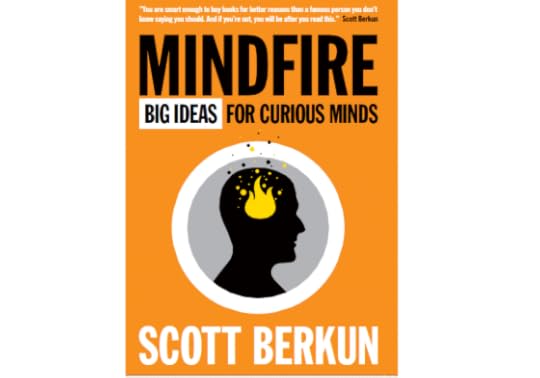
And as sneak peek, here's the interior design, which we're finishing up now. The book is divided into three parts: Gasoline, Sparks and Fire, each comprised of a different set of essays.
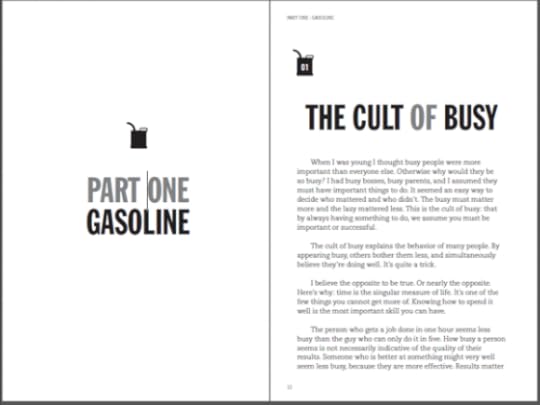
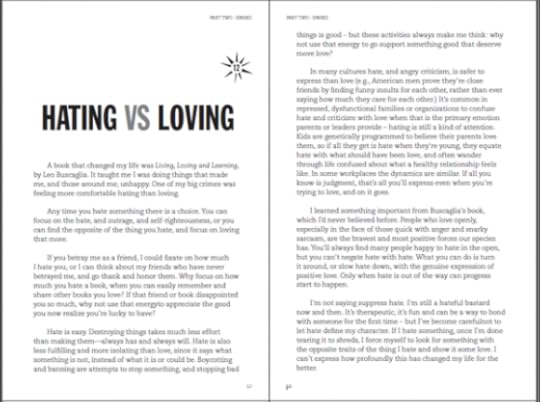
More details soon. Thanks to everyone who voted and offered opinions. Hope you're happy with the results.
Right now I'm working with Tim to finish up the final proofreading and design tweaks, and soon we'll be starting the actual publishing process.
Considering pre-ordering the book? Head over to the kickstarter page, where you can read more about the book, and pre-order the kindle edition, or try to nag me into making more pre-orders for the print edition available.
Related posts:Vote on Mindfire cover: Final Round
Confessions (new book cover and more)
Cover designs for Mindfire: vote!
New update on the next book
Research help: how many species have there been?
If you like my work, can you lend a hand?
If you like my work, I can use your help.
When the paperback edition of Myths of Innovation came out, I put together a little email list for volunteers willing to help with PR. It worked well and folks helped by using their networks, real and online, to get attention for the book on blogs, Facebook, twitter and (gasp) good old print media. It was fun for volunteers to interact directly with me (so they claim) and help contribute to work they care about.
My fourth book, Mindfire: Big Ideas for Curious Minds is almost ready for publishing – and my focus now shifts to PR and marketing for the book, which in many ways is the biggest challenge of all.
Might you have:
some time to help?
Maybe an hour a week? Maybe more here and there?
Are you willing to send an email or two to your network?
Ideas for PR - events? competitions? embarrassing things I can do to draw massive attention?
Or does Stephen Colbert owe you a favor you can lend me?
If so, please join:
http://groups.google.com/group/berkunfan
Thanks for your support.
Related posts:What virtual seminar do you want me to do?
How To Fix Email: A Radical Proposal
Mark the Date: Oct 13th Myths of Innovation day
How much to charge for speaking?
(Seattle) Presentation camp schedule up!
August 29, 2011
Vote on Mindfire cover: Final Round
Over 400 people voted on the last set of cover designs. Wow. Who thought you'd find this so interesting? The pre-order page is now up, and off to a great start. I appreciate all the support for my first self-published effort.
Since so many of you participated, we're back, after weeks of work and iterations, with another round of designs for you to look at. This is likely the final round, so choose wisely.
Design A:
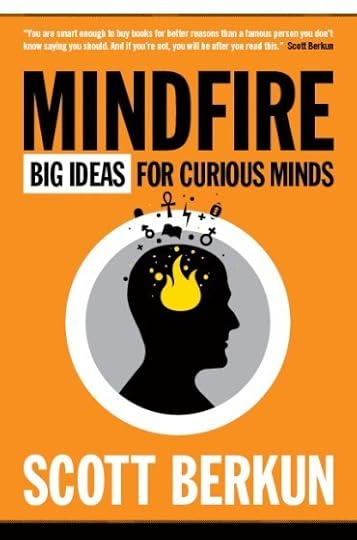
Design B:
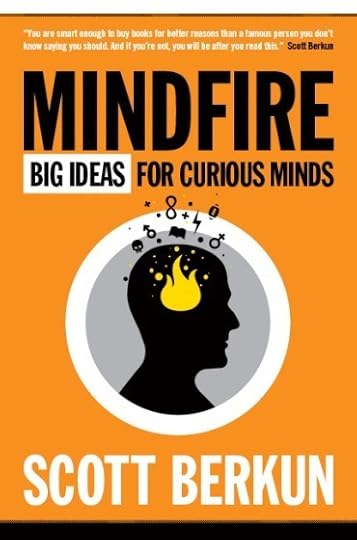
Design C:
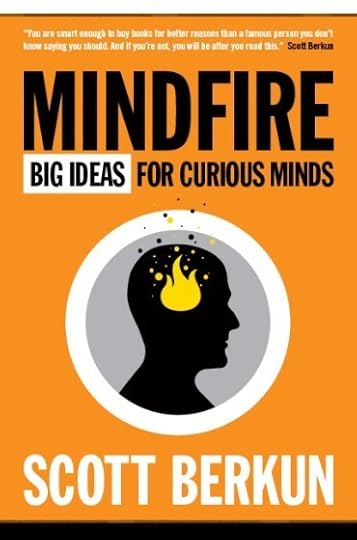
View This Poll
Related posts:Cover designs for Mindfire: vote!
This week in ux-clinic: Can UI be funny?
Art of PM book: what do you want in 2nd edition?
This week: when the party's over
August 25, 2011
Mindfire preorders now up – via kickstarter
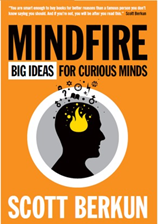 You can now place pre-orders for Mindfire, for kindle or print, by going to the brand new kickstarter page. Beyond the book, there are fun items in limited supply you can get:
You can now place pre-orders for Mindfire, for kindle or print, by going to the brand new kickstarter page. Beyond the book, there are fun items in limited supply you can get:
Get your name in the acknowledgements (if you pre-order before 9/1)
Signed copies of the new book
A package of all four of my books, personally signed
A one hour Skype chat – you rent my brain from the comfort of your computer
I'll travel to you (U.S) and deliver a lecture of your choice
Please check it out and help spread the word.
Important Note: I'm still working out the details, but it is possible I'll give the book away for free in some digital formats for the first few days, as a thank you to my fans. No promises, but I don't want anyone pissed if this happens. If you're strapped for cash, and are digital only, wait until launch, first week in October.
To guarantee you get the book, or if you don't mind actually paying writers, go right ahead and pre-order now.
Pre-order Mindfire: Big Ideas for Curious Minds.
P.S. Cover design isn't final, but close. A post about the design coming soon.
Related posts:Need ideas: fun rewards for Mindfire book pre-orders?
Cover designs for Mindfire: vote!
The new book: Mindfire. What is it?
On working for free
The new book is on its way: update soon
August 22, 2011
How to Sleep on a Plane
Sometimes an article is poorly written in a way that makes it hard to tell if it's satire or not. This recent NY Times article on How to Sleep on a Plane, fits the bill:
If you can sleep on a plane, after all, you must have a higher consciousness that doesn't stew about cramped quarters or fellow passengers. But you also arrive well rested. You use your time wisely. You recognize that people have been sleeping as long as there have been people; you don't get hung up on brief fads like pillows, sheets and brushed teeth. Is it too grandiose to say that the airplane sleeper is in touch with his humanity in a profound way?…Plane sleep is among the most rewarding and satisfying and even impressive skills a modern person can acquire.
Most of the article has this dreamy, navel gazing tone, which results in a writing sin – not offering any advice despite the word HOW being in the title of the article.
Here's my advice on how to actually sleep on a plane:
Get exercise before you fly. On planes you sit and eat and watch for hours. It's unnatural. Before you fly, go the gym, or at least make sure you go the night before. I guarantee there is a quantity of exercise that if done before you fly will ensure you sleep on a plane. The question is: are you willing to do it? The more you do, the better your odds.
Get there early. Then you don't need to rush and can walk instead of taking trams, automated walkways (flat escalators) and shuttles. You can carry your bags and get some extra exercise, instead of putting everything on wheels. Your stuff isn't that heavy – just carry it. The walking and carrying are exercise your body needs to relax and feel like its earned its sleep.
Dress for flying. Do you sleep in a suit or a dress at home? No. Wear something nice but comfortable. Wear comfortable layers so you can control your temperature at any time, even if they run out of blankets. Pack to make this possible. Wear decent socks so you can take your shoes off (Do you sleep with your shoes on at home? I hope not).
Get your ticket early. Everyone has their preferences on aisle vs. window (See my Top Ten Die Hard Travel Tips) and you're more likely to get them if you book early. It's worth an extra $15 or $30 to me to get the seat of my choice, especially if I know I need the rest.
Walk the plane. When you go the bathroom, take a stroll. You are allowed to walk up and down the aisles if you like, or linger in the bulkheads to stretch or just stand. A walk, or a stretch, gets the blood flowing which can make your body more relaxed, which makes sleep easier.
Comfort is size related. I'm about 5'9″ and in good shape. I can be comfortable just about anywhere. But my 6′ 4″ or more portly friends have an entirely different challenge in getting comfortable and sleeping. Some things can't be compensated for. The people you see sleeping on the plane might simply be a better fit for flying.
Don't eat or drink too much. Everyone is different, but booze and food likely makes it harder to sleep, not easier. Booze should be limited anyway since flying dehydrates you and alcohol does as well: hangovers are easier to find up in the sky.
Pack light so your legs are free. I see people cram the largest possible duffel bag into the area under the seat in front of them. It's pure masochism. Pay the extra $15 for checking another bag, or be willing to wait for checked bags to arrive if it's your only bag. Most people don't pack well, so they take many things they never need, causing unneeded suffering at every stage of the trip, including the flight.
Get a good pair of headphones. Even if you don't like music, listening to something of your choice, including silence, has a big impact on relaxation. Planes have tons of bad background noise (engines, babies, movies, annoying passengers) The headphones they give you are always awful – spend $30 for a decent pair you like.
Don't depend on working on the plane. It's a bad environment for work. You might be able to get a few things done, but never at the same level of quality for time invested. If you are depending on flight time to get work done, you will be stressed and worried and less likely to switch into a restful state of mind.
Learn to Relax. Many people don't sleep well at home and its no surprise they fare worse in the air. Learn a simple breathing technique (Take 10 deep breaths, focusing on the breath, with your eyes closed), which is a kind of simple meditation. Just do it. You're guaranteed to feel better. And if you don't, you just succeeded in killing some time.
What are your tips for sleeping or being comfortable when you have to fly?
Related posts:Top ten die hard travel tips
Daily writing plan
This week in pm-clinic: Innovate or die
Book tour: hurry up and wait
Where do your ideas die? (With a bad illustration)
August 21, 2011
Need ideas: fun rewards for Mindfire book pre-orders?
I'm setting up a page on Kickstarter to let folks preorder my next book, MindFire (details here).
One downsides with self-publishing is pre-orders are a logistical challenge – every author I've asked has used the wonderful kickstarter to make it work.
The upside is this: I can give away crazy things with book pre-orders. Some possible ideas are:
(These are examples)
For $XX, you'll get the book, and I'll write an essay on the blog on any topic you wish.
Buy 5 copies, and serenade you on video with a song of your choice.
A personal youtube video lecture
A visit to your company (as in I get on a plane and give a talk of your choice at your office, or favorite bar)
A phone consultation (use my brain as you wish for 30 minutes), o
A copy signed with a personal note to your boss.
The possibilities are endless…
Have ideas? What fun things should I include on the kickstarter page for MindFire?
Leave a comment. Thanks.
Related posts:The new book: Mindfire. What is it?
Cover designs for Mindfire: vote!
Wednesday linkfest
CMU Lecture now on YouTube
The new book is on its way: update soon



